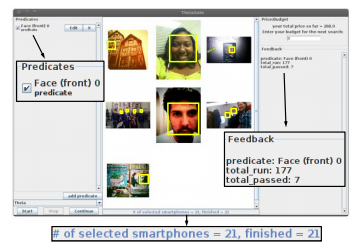The Killer App For Crowdsourced Photographs
Imagine the following scenarios. A small boy becomes separated from his parents at a holiday parade. In a packed soccer stadium, in full view of thousands of fans with cameraphones, the TV cameras somehow miss the angle that would give the perfect picture of a goal. And during a family photoshoot, a thief burgles the house next door.

In all these situations, photographs taken by one or more people would be useful to other people. In the first case, any photographs of the parade taken in the moments after the boy was lost would be crucial for the police. They would be equally interested in the picture of the thief in action, which could prove to be valuable evidence. And in the final case, a sports editor would pay good money for a photograph taken at just the right angle and time, which may well exist on on camera among the thousands of fans at the event.
The question is how to search for these pictures when they are storied on mobile devices of limited power.
Today, Ardalan Amiri Sani and buddies at Rice University in Texas unveil a service called Theia that can do the trick.
Theia is a distributed search service that scans through all the photographs on a registered smartphone looking for ones that match a certain search query.
That sounds potentially expensive. Imagine calling 50 or a hundred friends in the space of a few minutes: how much would that cost?
And how pleased would you be to find that at the very moment you need it most, your smartphone is running at a snail’s pace because somebody else is searching the pictures it contains?
But Sani and co have developed a distributed search algorithm that minimises the cost to the searcher and also the disruption to the phones being searched.
It uses a two stage search system which first identifies promising candidate photos and then uploads these to the cloud where a far more powerful search algorithm can do its job without using up smartphone juice.
This, they say, is “the first working system that allows content-based search of photos inside smartphones.”
This kind of opportunistic search could certainly be useful in an albeit limited number of circumstances.
We’ve seen this kind of idea used to great effect in amateur astronomy, where many photographs of a comet together give a good indication of the comet’s trajectory around the Sun.
Perhaps there are similar applications in social situations here on Earth. The question is whether anybody can think up a killer app.
Ref: arxiv.org/abs/1106.5568: Opportunistic Content Search of Smartphone Photos
Keep Reading
Most Popular
Large language models can do jaw-dropping things. But nobody knows exactly why.
And that's a problem. Figuring it out is one of the biggest scientific puzzles of our time and a crucial step towards controlling more powerful future models.
The problem with plug-in hybrids? Their drivers.
Plug-in hybrids are often sold as a transition to EVs, but new data from Europe shows we’re still underestimating the emissions they produce.
Google DeepMind’s new generative model makes Super Mario–like games from scratch
Genie learns how to control games by watching hours and hours of video. It could help train next-gen robots too.
How scientists traced a mysterious covid case back to six toilets
When wastewater surveillance turns into a hunt for a single infected individual, the ethics get tricky.
Stay connected
Get the latest updates from
MIT Technology Review
Discover special offers, top stories, upcoming events, and more.